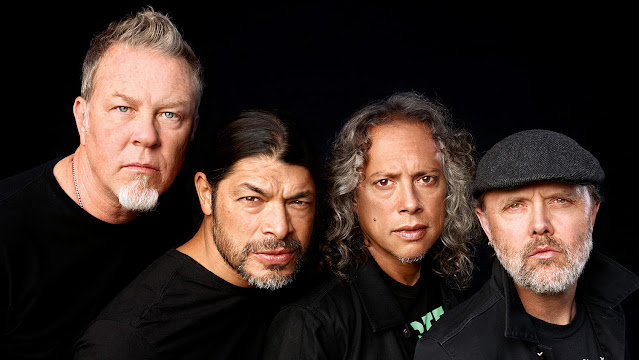Metallica, 72 Seasons, 2023
Album
number 11 in the career of what is considered the most important band in the
world of heavy metal. Three albums in a row have been released by Metallica and
the most remarkable thing is the consistency. I do not expect from them an
album at the level of Master of Puppets or Kill Em All, but I do expect what
James Hetfield himself has promised "full speed or nothing". And if
we talk about that, I can say that 72 Seasons almost fulfills 100%. Death
Magnetic, produced by the tremendous Rick Rubin and released in 2008, returned
the band to the hardcore sounds of the 80s. Hardwire...To Self-Destruct,
produced by Rubin's pupil Greg Fidelman, showed that the band had found a
musical vision again and had left behind the confusion of albums like Load,
Reload or St. Anger. 72 Seasons is not the so-called "black album",
an album that I never enjoyed and that for me was almost the death of the band.
72 Seasons is a concept album that talks about the 4 seasons per year that
appear during 18 years. To some extent its inspiration emanates from the same
place as the Beach Boys' legendary Pet Sounds. It is an album of nostalgia,
fear and maturity, the cover is perhaps a little out of place, but the yellow
and black is still a reference to the so-called radioactive clover, danger,
Stryper, the Scorpions and well, heavy metal in general. Perhaps the band's
adventure with Lou Reed on Lulu helped Hetfield to take certain conceptually
ambitious inclinations, which is not all bad (Reed also taught them to rely
more on instinct, the band would admit).
I like
thrash and heavy metal albums that go at full speed, and for this reason 72
Seasons seems to me an interesting and attractive album at least. The band used
their intelligence to link the unexpected success that came after the legendary
Master of Puppets song from 1986 was included in the Stranger Things series,
with this new album. In November of last year, they released the single Lux
Aeterna, and then came several subsequent tracks. The strategy was a bridge
that helped to maintain the expectation, but prevented it from overflowing,
which is good, Metallica's fans are among those who generate more expectations
and this has worked against the band on many occasions. Lowering expectations
is a weapon in 72 Seasons' favor. There are songs "at full speed",
such as the one that names the album or Shadows Follow, which also uses demonic
speeds. James Hetfield and Lars Ulrich continue to dominate the band's songs.
On the one hand, Hetfield is still a monstrous guitarist, although his style
has evolved from a guitarist who used his instrument as a percussion, hitting
the strings, to a guitarist who goes through his whole instrument strumming all
the strings like a funk machine (a modern guitar style in the heavy metal world
developed by, among others, the great Tommy Victor of the Prong).
On the
other hand, Ulrich, who contributed a lot to the band's sound on albums such as
And Justice For All, has become a kind of ballast, with the mission of
completing the band's transition to a modern heavy metal group. Unfortunately,
Ulrich is neither Dave Lombardo, nor Gene Hoglan, and this leaves Metallica in
a middle ground in that evolution that could bring them back to the forefront.
Kirk Hammett even lives that schizophrenia, with guitar solos that go from the
melodic of recent years, to the manic of the early years of the band. Perhaps
Fidelman's experience with High On Fire, has made the band learn to combine
sounds, references or winks to their previous stages in an interesting way as a
technique to self-reference and create a new sound that mixes the classic and
the recent (72 Seasons could be seen as a clever mix of Kill Em All, the
"black album" and St. Anger, which might be hard to imagine, but
surely sounds better than many think). The pillars of the band's sound are
present throughout the album, it is not difficult to distinguish the influence
of Black Sabbath in several songs (You Must Burn! and Inamorata), Motorhead,
obviously, and Diamond Head. Metallica gave up on being a thrash metal band
after ...And Justice For All, expecting an album in that direction would be a
mistake. The best thing is that the band also gave up on being an alternative
metal band after the St. Anger album (the fact that there are no ballads is a
great advantage and the slow songs are pure Black Sabbath).
The complex
thing about the band's direction is that today they are no longer the brutal
instrumentalists they were in the past, they attend more to technical and
melodic details and that takes away spontaneity and fierceness in their sound,
however, 72 Seasons is not a bad album, it is the third album in a row in which
the band shows consistency and focus, and that is to be applauded. Also, the
production is more Hetfield's and Ulrich's than Fidelman's, and that may work
against the band's ability to judge themselves, less songs and less length
could have worked in the band's favor on this album. The challenge for the band
is how to get the best of what they have demonstrated on their three most
recent albums, in order to remain consistent, which to this day is their
greatest virtue. Full Speed or Nothing!



Comments
Post a Comment